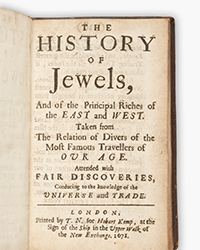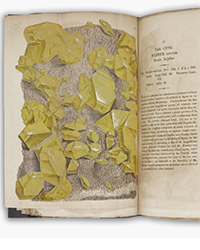Sometimes when you really believe in something, believe in it to the extent some might think it an obsession, you can achieve things few would have thought possible. This is the story of Richard Hopp, an unusual book collector from southern California, and his quest to protect book collectors and small-time sellers from the clenches of a law that legally could have turned them into participants in organized crime, simply for doing what collectors and small-time sellers do. Perhaps Richard Hopp was inspired by the great books in his quest to change California legislation, but it seems more like his guiding literary work was The Little Engine that Could.
Richard Hopp ran into the long arm of the law a few years ago when he was charged and convicted in Los Angeles under a statute designed to prevent the fencing of stolen goods. Some pawnbrokers and flea market sellers undoubtedly buy stolen goods off the street for pennies on the dollar and resell them for dimes. In the book field, the source of supply for such goods is often public libraries. Street people, perhaps feeding a drug habit, remove books from a library, sell them cheaply to an unscrupulous small-time seller, and repeat the process ad infinitum. The seller knows darn well the books are stolen, but is insulated from the crime by buying them “legally” before reselling.
The result is that many jurisdictions have enacted laws that apply to such small-time sellers, requiring licensing and such, and affording police the right to seize merchandise if they think there is reasonable cause to believe it may be stolen. Such regulation, while unfortunate in its adding burdens to legitimate merchants, is not an unreasonable demand to stem the enormous amount of fencing that enables a comparably large amount of theft to take place. It is the price of security. Prevent thieves from being able to resell stolen merchandise and you remove the incentive to steal it in the first place.
However, Mr. Hopp was not a merchant. The charges presented no evidence he ever sold a single book or made a dime. There was only evidence that he bought books, a charge of which every book collector on earth is guilty. Why was such a prosecution brought in the first place? Evidently, the authorities concluded that Mr. Hopp must be a dealer in books because of the way he purchased them. He would set up a buying, rather than selling booth at flea markets. He would advertise on places like Craig's List, seeking books. Authorities concluded he must be reselling books if he bought in bulk this way, though they never had a shred of evidence he made a sale. Mr. Hopp explained that he purchased this way for his own use, keeping those books he liked and giving away those he did not.
Obviously, authorities were confounded by this answer and refused to believe it. In some countries, people are convicted and sent off to gulags based on what the police think you are doing without a need for evidence. Fortunately, America is not such a country. When Mr. Hopp was convicted for not obtaining the proper license, the case was made on the technical reading of the statute, which required licensing of those in the “business of buying or selling books.” Surely the intent was to apply to those “buying and selling” books, not just one or the other, as no one was going after the well-heeled book collectors of Los Angeles and charging them for unlicensed book buying. Mr. Hopp was obviously targeted based on unproven assumptions.
On appeal, the conviction was thrown out. The appeals court said that regardless of the “or's” and “and's,” he was not engaged in a business, “business” requiring a profit motive and there was no evidence Mr. Hopp ever made a penny from his book buying “business.”
All of which brings us to legislation recently proposed in the State of California. It is designed to bring some statewide order to these issues, and, for the most part, Mr. Hopp is satisfied with the proposals. However, there was one section that set him off with the same tenacity he pursued his own case a few years ago. Mr. Hopp is not wanting for passion. It included a section that defined “criminal profiteering activity.” It was filled with what you might expect – murder, mayhem, arson, child pornography, robbery, pimping, extortion, felonious assault, human trafficking, and other gruesome crimes. Down at the end was a section that included “buying, selling, trading, accepting for sale on consignment, or auctioning secondhand tangible personal property.” Under the statute, actions by small-time secondhand sellers could become part of a “pattern of criminal profiteering activity,” and the behavior could be considered “organized crime.”
One can hear the agitation in Mr. Hopp's voice as he discusses the legislation. You might say no one would ever prosecute a small-time bookseller or collector as a member of “organized crime” for not correctly dotting every “i” in their licensing requirements, but then again, who would have thought anyone would ever prosecute someone for buying books?
Once again, Mr. Hopp was zealous in pursuing his beliefs. It didn't matter that this time the case no longer targeted him personally. He hired a lawyer anyway, repeatedly contacted state legislators, and made several appeals against the legislation. He did not feel he was gaining much respect from the legislators. It was not a pleasant process. Nonetheless, at the end of the day, the legislation was passed without the offending material. It was struck from the legislation. Small-time vendors and book collectors in California will not have to fear being carted off to prison for organized crime like some mafia don. It wasn't easy, but you can fight city hall. As Mr. Hopp commented, “I'll never be known for what I stopped, but everyone in the world would know if I didn't.” So rest easy, California book collectors. Mr. Hopp is looking out for you, even if you are completely unaware he exists.
Or, as Richard Hopp often concludes his messages, “Keep well.”























![<b>Heritage, Dec. 15:</b> John Donne. <i>Poems, By J. D. With Elegies on the Author's Death.</i> London: M[iles]. F[lesher]. for John Marriot, 1633. <b>Heritage, Dec. 15:</b> John Donne. <i>Poems, By J. D. With Elegies on the Author's Death.</i> London: M[iles]. F[lesher]. for John Marriot, 1633.](https://ae-files.s3.amazonaws.com/AdvertisementPhotos/8caddaea-4c1f-47a7-9455-62f53af36e3f.jpg)




